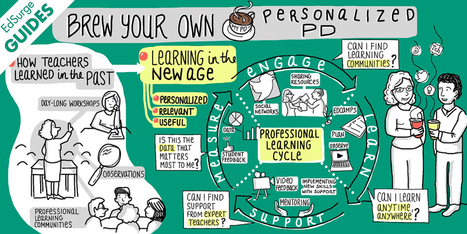Personalized learning is on the rise for learners in our schools. Redesigned schools include personal learning plans, playlists of content tailored to fit each learner, adaptive curriculum, and access to learning anytime and anywhere. That's great for students but what about teachers? Where's the pe
Get Started for FREE
Sign up with Facebook Sign up with X
I don't have a Facebook or a X account
 Your new post is loading... Your new post is loading...
 Your new post is loading... Your new post is loading...

Gust MEES's curator insight,
February 6, 2014 11:07 AM
IMHO: Use ICT skills to find out about understanding, through blogs from the students. Make a preparation with a FlowChart about what YOU want students to know and compare it to the obtained results. Make an update of YOUR FlowChart with a new entry "IF => THEN => GO TO" and bring in a new task 2 adjust for BETTER knowledge which YOU apply then with the students. Redo again the blog with the students and find out if it worked. Discuss it with the students and ask them for collaboration as a Home-Work to become BETTER! THEY will learn to get the necessary skills with TEAM-WORK envolved, that will work ;)

Agustin Bastida's curator insight,
October 20, 2013 4:28 PM
La otra parte del engranaje. El docente conectado en red...eTwinner |

Brent MacKinnon's curator insight,
February 9, 2014 8:18 AM
A very practical description with examples of ways to become better in your critical thinking. A good primer for sense making as part of the PKM framework. 
Terry Doherty's curator insight,
February 15, 2014 8:00 PM
"Navel gazing." I haven't heard that term in ages ... and don't do it near enough.

Todd Bratcher's curator insight,
February 18, 2014 6:46 PM
Critical thinking means to ask questions that need to be asked. it involves finding the significance in every piece of information you come across and formulating opinions and plans of action. You have to ask the tough questions and the best one to start with is "Why?" Critical thinking is about being curious and allowing your sense of curiosity to follow the "why".Often times following the why will lead to finding the truths and finding lies. Critical thinking is also about honing in ones BS detector. Take time to analyze information before accepting it's credibility. |














A new era of personalized professional development is sweeping into schools. We've created this guide to capture the extraordinary changes in PD tools and in the cycle of learning. We look here at tools that support how teachers engage with colleagues; that help teachers learn or find support for implementing fresh strategies and approaches; and that measure how that learning impacts practice in the classroom.